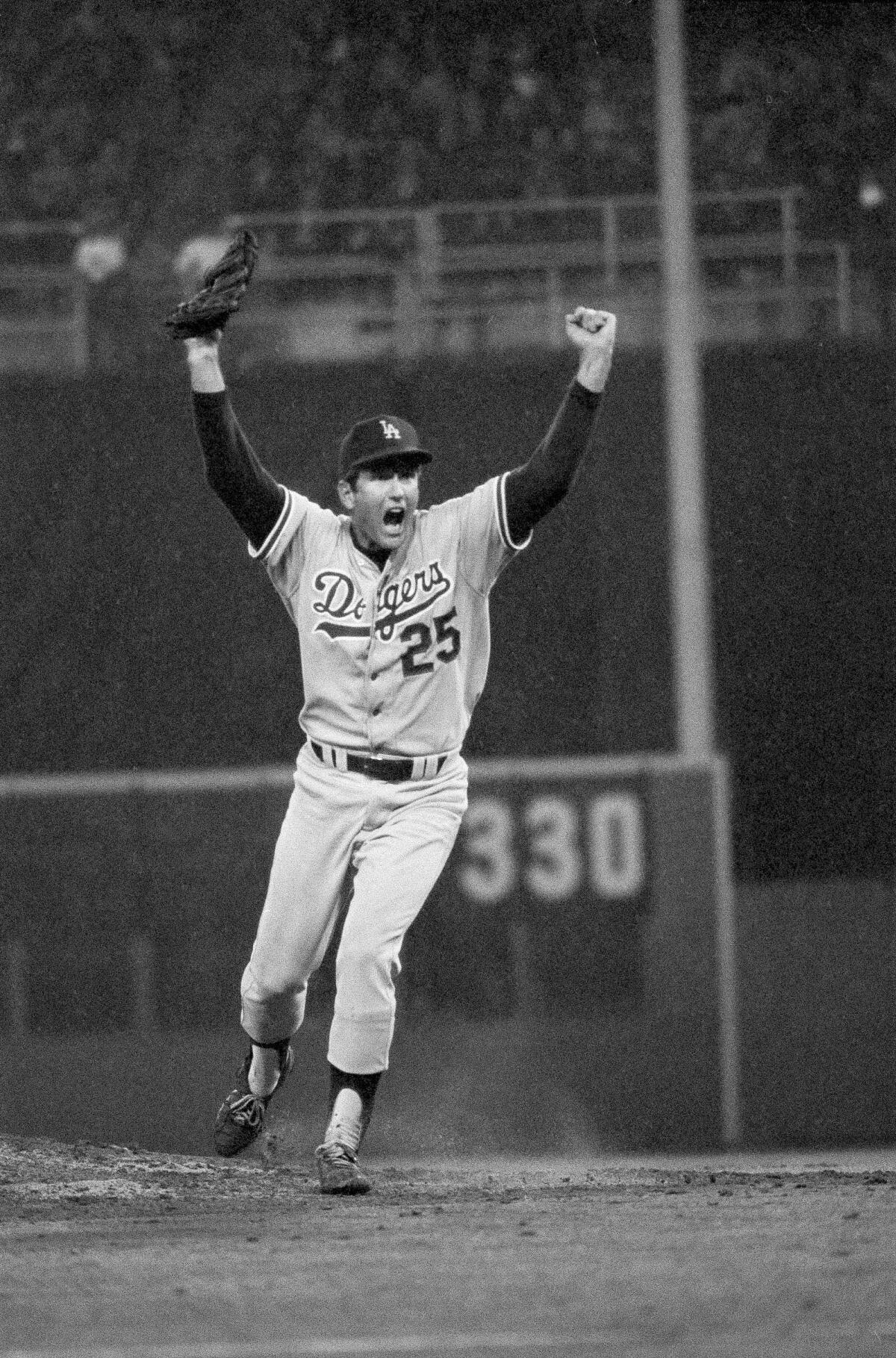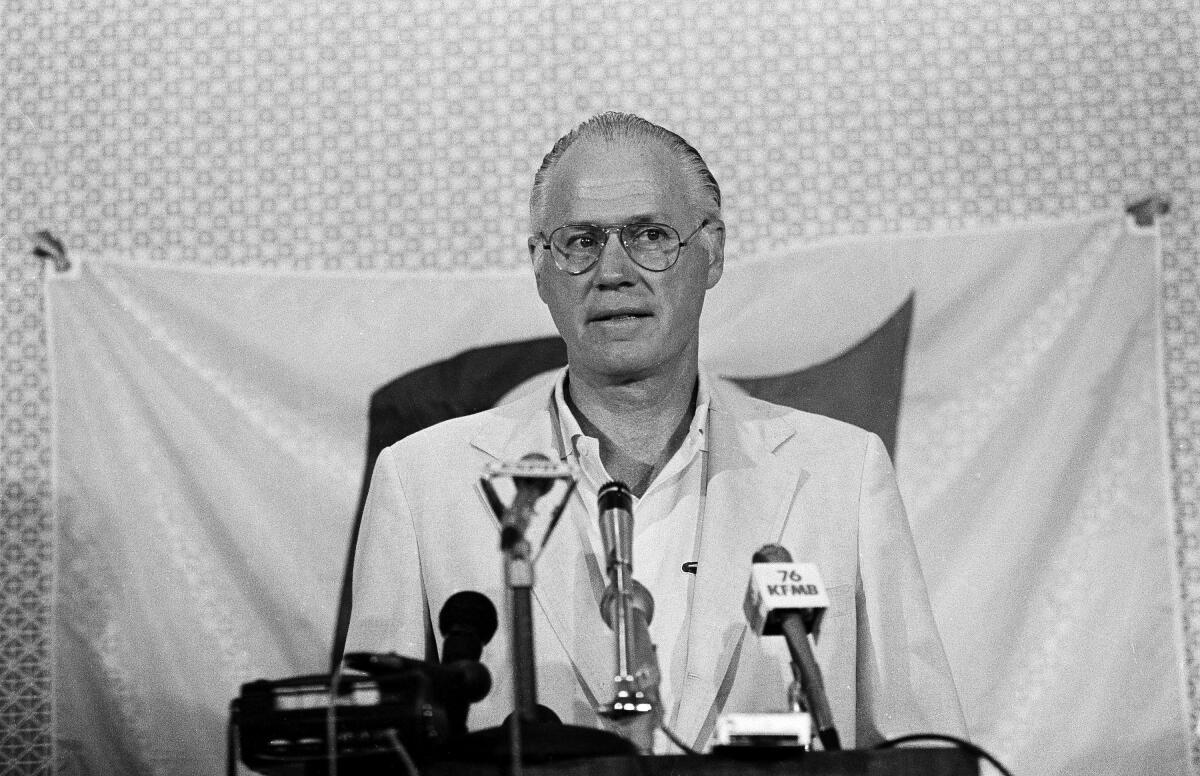Former Sports Illustrated journalist Melissa Ludtke shares behind-the-scenes stories of her fight for gender equity in her new memoir, “Locker Room Talk.” The Dodgers’ support in 1977 triggered a backlash from the MLB commissioner and paved the way for her groundbreaking lawsuit to secure equal clubhouse access for male and female reporters. The following is an excerpt from her book.
In the fifth inning of the first game of the 1977 World Series, Major League Baseball commissioner Bowie Kuhn deputized his second-in-command to tell me the press pass giving me access to the teams’ locker rooms was useless. My press pass said I could be there when the male reporters were, but Kuhn, his deputy told me, had barred me from going into the Yankees’ and the Dodgers’ locker room. It didn’t matter to him that both teams had told me I could. A week or so earlier, the Yankees’ PR director had given me a clubhouse pass to use for the last two games of the season, and I’d reported inside that team’s locker room then. Nobody kicked me out, nor did any sportswriter write about me being there. I’d also worked inside that locker room at the American League Championship Series, and again nobody complained or tossed me out or wrote about me being where Kuhn decided I didn’t belong.
(Rutgers University Press)
With the Dodgers in New York for the World Series, I had thought I ought to give those players a heads-up before the series began since I might be working in their locker room. No one told me to do this, but I knew no woman covered that team. I did this as a courtesy since I didn’t want to shock the ballplayers by walking in. At Monday’s workout, I’d talked with the Dodgers’ player rep, Tommy John, who listened patiently as I told him how I worked in the Yankees’ locker room. He looked at my press pass with my name on it and saw that I had permission to be in the teams’ clubhouses. Then he asked a few questions before telling me that he believed I had the right to be there. But my request was new for his teammates, so he wanted to talk this over with them. They’d take a team vote, he said, and he’d tell me the result before Game 1 on Tuesday night.
“It wasn’t unanimous, but we go with the majority and a majority said you have the right to be there,” John said when we met at the backstop after batting practice before the first game.
With the Dodgers’ affirming vote, my prior experience with the Yankees, and a press pass certifying my right to work in both clubhouses, I’d done all I could to ensure that my locker room reporting worked as well as it could. So, as I heard the commissioner’s deputy forbidding me to enter, I wondered what transpired after my meeting with John to have both teams’ locker rooms be off limits to me.
My answer came swiftly. After Kuhn learned about the Dodgers’ vote, he decided that I wouldn’t be going inside. Applying his dictatorial power, Kuhn banned me from the locker rooms. Then, for good measure, he had his deputy inform me that I wouldn’t be working in any team’s locker room as long as he was commissioner. At fifty, and only a few years into the job, he was young and, I imagined, happy enough in his job to stick around for a while.
Kuhn’s reasoning boiled down to anatomy — mine, above my bra line, and the ballplayers’, below their belts. That my press credential dangled from a string around my neck and came to rest on my breasts made all the difference. Midway through Game 1, Kuhn’s media director told me I was to stay out of the locker rooms. He reminded me that the ballplayers’ privacy had to be protected even though not one player had requested this protection. Guided by his own moral compass, Kuhn stopped me because he could, and by doing this, he stole from me the first World Series reporting opportunity I’d had, and one that I’d worked hard for two seasons to attain. Just a few weeks earlier, when Sports Illustrated’s (SI’s) baseball editor, Peter Carry, told me I’d be part of the magazine’s team covering the biggest sporting event of the year, I’d skipped back to my office, hopping on air with “I made the team” ringing in my head.

Dodgers pitcher Tommy John yells as he charges off the mound after a 4-1 playoff win over the Phillies in 1977.
(Associated Press)
I was elated.
In hearing Kuhn’s edict, my mind flipped back to my anticipatory excitement when I’d ridden the subway from my office in midtown Manhattan to Yankee Stadium in the Bronx that Monday afternoon. Approaching the 161st Street station, I felt an adrenaline rush in envisioning myself at batting practice talking with players and managers while surrounded by the hundreds of sports media people who were in New York for the first two games of this World Series. Before the first game, I’d been with the other sportswriters at batting practice, but now Kuhn had dashed any hope I had of this series being a breakthrough moment for me as a baseball reporter. Being denied the access I needed to report, I wasn’t much use to SI.
This broke my heart especially because I knew I couldn’t appeal Kuhn’s decision. In baseball, his authority was absolute. Few challenged a commissioner’s decision. Team owners were careful not to second- guess his judgment, at least publicly, and those working in baseball knew not to tread into his territory. This is the way things had been in this game since the owners signed an agreement in 1921 saying that any commissioner had their authority to act, as he saw fit, in the “best interests of baseball.” This clause had also proven to be a commissioner’s most reliable protection in court.
On October 11, 1977, a Tuesday night, Kuhn believed that my exclusion from locker rooms was in the “best interests” of his game, so he acted, as only he could.

MLB commissioner Bowie Kuhn speaks during a news conference in San Diego on Aug. 19, 1982.
(Lenny Ignelzi / Associated Press)
I was graduating from high school in 1969 when baseball’s owners elected Kuhn to be Major League Baseball commissioner. Then 42, he was the youngest commissioner in the game’s history, as well as its tallest at six feet, five inches and heaviest at 240 pounds. He cut an imposing figure and with his ascension he inherited the singular power to run baseball as he saw fit. As I later discovered, his extensive power in professional baseball wasn’t enough for him. In Ridgewood, New Jersey, where he was raising his family, he oversaw his suburban town’s Little League, applying these same beliefs about the inopportune mix of girls and sports. At a time when girls in New Jersey were fighting in court to win the right to play Little League ball, the local Ridgewood News and the Bergen Record quoted Kuhn as saying that “girls playing sports would ruin it for the boys.” Kathleen A. Doyle, who was a sports- loving student at Ridgewood High School in the 1970s and knew about my legal case, emailed me to share her memories. She recalls Kuhn directing his “venom against young girls in our town who wished to play sports. … There was great pressure coming from Bowie Kuhn to denigrate girls who did play sports.” The girl who wanted to compete in sports, Doyle added, “had to fight for after- hours time on the fields. Only the boys’ teams were given uniforms and trophies.”
Kuhn’s beliefs about girls in sports, and me, in particular, in his game, would be put to a legal test by a judge in the Southern District Court. He’d inflamed fans with incendiary words about me as a wayward girl hectoring his unprotected naked men, but my attorney was preparing to challenge his discriminatory treatment of me in ways that no commissioner had experienced in baseball’s other court cases. I didn’t work for baseball. I only reported on its games. While Kuhn had absolute authority within baseball, in court we’d test whether his power extended to me.
When on Friday afternoon, April 14, 1978, I went to the Southern District Courthouse to hear my lawyer argue my case, I knew that lots of Americans were rooting against me. In a few hours, we’d have a better sense of whether my lawyer had convinced the judge, who disliked baseball and rued the day she’d been assigned my case, to rule in favor of his female client who loved the game.
Excerpted from “Locker Room Talk” by Melissa Ludtke. Copyright © 2024 by Rutgers University Press. Reprinted by permission of Rutgers University Press.





